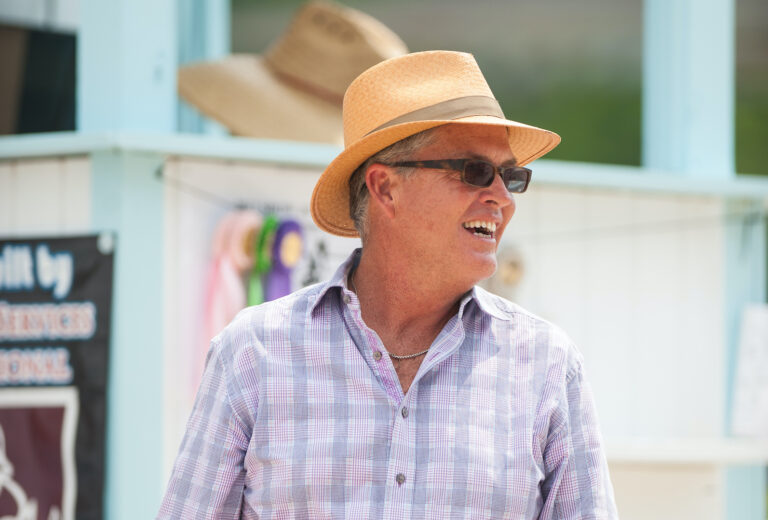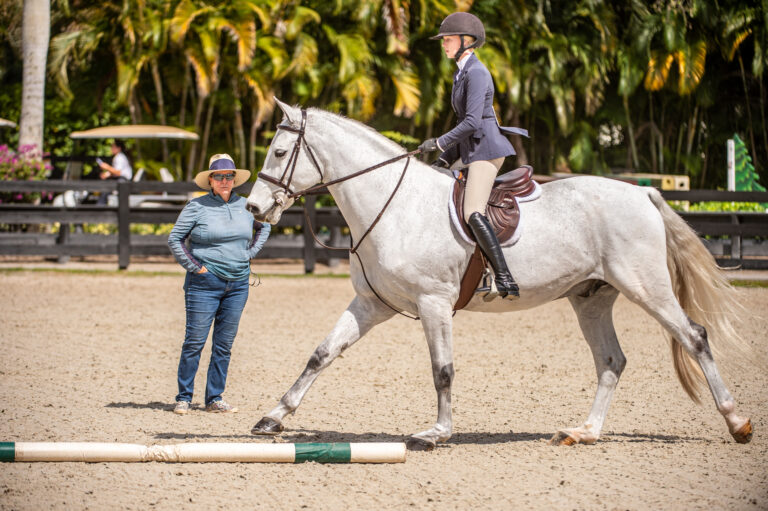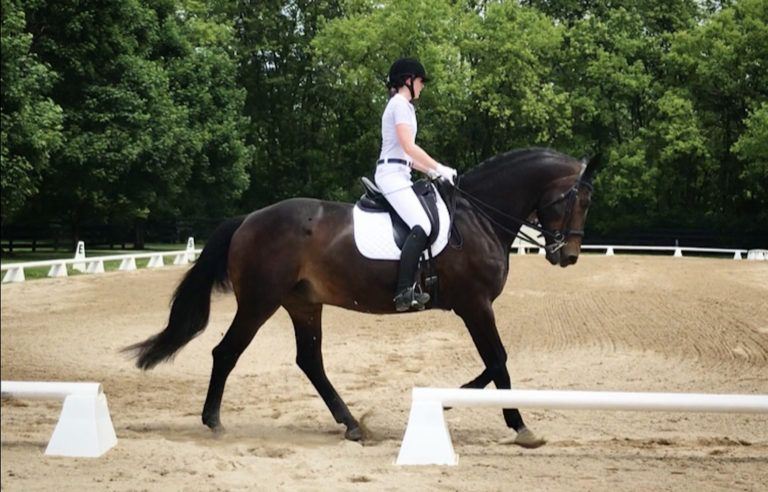Q: Why have you been successful?
MC: When you are young, you think your way is the only way. But there is more than one way to skin a cat. I was lucky enough to figure that out early on. I never stopped learning and asking questions, wanting to know what is new and being open-minded. I always asked: How could I be better?
Q: Why did you take a break from riding in your 20s?
MC: After college, I worked for [Olympic eventing champion] Mike Plumb for a year. But there was pressure from my family. They said, “Is this really a career with horses? Can you make a living doing this?” So I decided to try the nine-to-five thing. I worked as a sales assistant for two investment companies. I don’t regret it. I met some fabulous people, but I really stepped away from riding.
I had definitely traded my riding boots in for high heels. But there was something missing. I woke up one morning and decided my life was not happy. I was making good money, but the commute was killing me. I was going to work in the dark, coming home in the dark. I decided I needed a change.
I sent an email to my mom—which she has kept—saying that I couldn’t do this anymore. I said that being outside was “me.” I needed to be with the horses. My mom supported my life decision. In one week l broke up with my boyfriend, quit my job and started my life all over again. I was 28 years old.
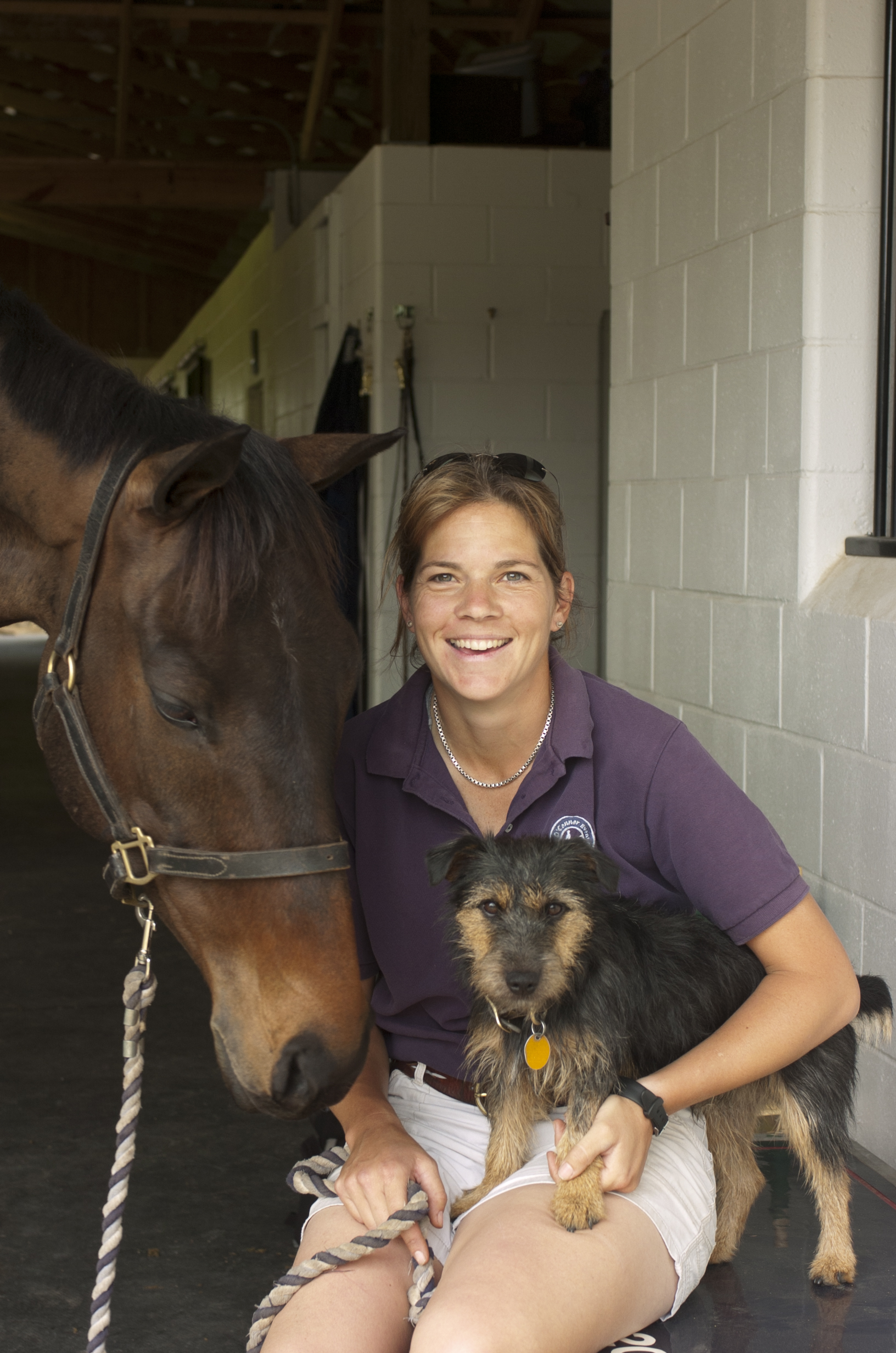
Q: What type of person works best with horses day in and day out?
MC: Someone who is aware, knows her horses and notices what is not right. It is hard to teach that. You also have to be selfless, hardworking and kind. Because these are animals, there is no point in being aggressive about it.
Q What have you learned about yourself as a leader?
MC: Sometimes if I have to confront somebody about something she’s not done correctly, it’s hard. I will have the conversation, but I don’t want it to come out wrong. I don’t ever want to hurt someone’s feelings, as I know they are trying. I have learned now to ask, “Do you think that was the right thing to do?” And I never do this discussion in public. It is always in a private setting.
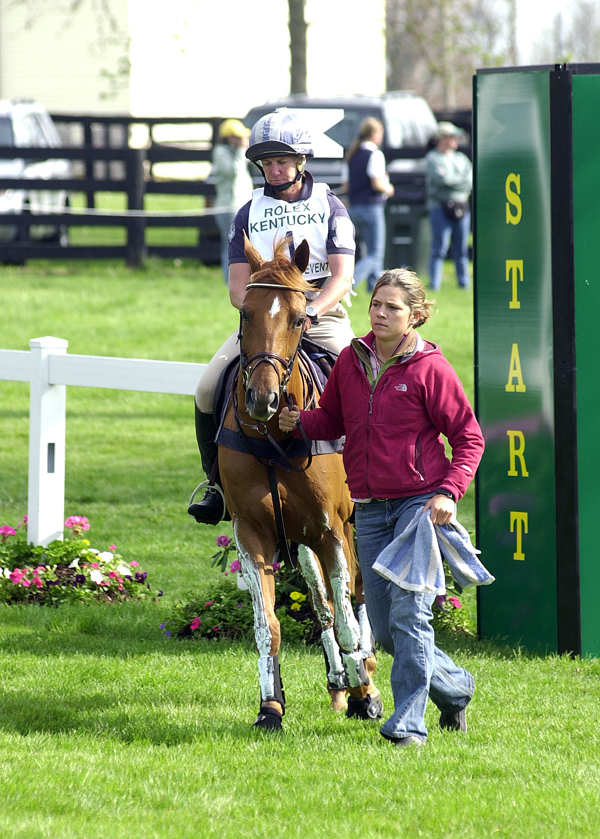
Q: How does it feel to be part of a winning team?
MC: When your horse does well, you have so much pride. You are so happy because these are your children. So you need to enjoy the moment because next week it might not be that way. You have to be gracious, too. Karen [O’Connor] always said, “Be nice to people on the way up because you’ll see them again on the way down.” I think that’s true.
Q: Do you have any regrets?
MC: I will always regret the day that Theodore O’Connor [Teddy] died. He was a very famous 13-year-old pony and was one of Karen’s best horses. He was only 14.1, but he was tremendously competitive against the biggest horses and was short-listed for the Hong Kong Olympics. I am sorry that more people didn’t get to meet him.
We were riding the horses out: Karen was on her Olympic and World Championship mount, Mandiba. I was on Teddy. The horses bolted—we thought it was a deer, but it turned out to be a bear behind a tree. Teddy nearly fell down, so I got off and tried to walk him back to the barn. But then the horses bolted again. There was no stopping either one of them. Karen got scratched up in a bush and almost came off. I tried to hold on to Teddy, but the reins broke and he ran down the hill. Somehow he cut his hind leg open, straight across. And we had to put him down.
Was that my fault? I don’t know. Karen would say that she was in charge, it was her fault. But in the end, it was an accident. The O’Connors were amazing, but it affected the whole team. It stung a lot, but you had to keep your chin up and keep going. Karen ended up going to the Olympics with Mandiba. And I had to tell myself that I was not the only person who had ever gone through something like this.
Q: Did Teddy’s death change you in any way?
MC: I think about it all the time. It is my job as a groom to keep the horses safe, and I could not keep Teddy safe that day.
Q: How would you describe a professional groom’s job?
MC: This is a lifestyle, not really a job. You have to work hard. Sometimes the hours are ridiculously long. You have to have a sense of humor and be ready to be part of a team.
Q: Given that tough lifestyle, what type of person chooses to become a groom?
MC: You are a caregiver and you see yourself as a caregiver. But I just choose to care for horses, not for people. A lot of my friends who have groomed with me over the years have ended up becoming nurses.
Q: What is the best part of a groom’s day?
MC: I always loved doing night checks. It’s dark, you turn the lights on and the horses blink their eyes. They are so quiet and within themselves at that time—they are in their stalls, in their world. Sometimes they are a little sleepy and they will snuggle a bit, which is a precious moment. You go in and throw some hay, and all you can hear is the horses munching. I am tucking them in. It’s a moment when I appreciate them and they appreciate me.
Q: Who do you admire?
MC: I admire my mom a lot. She is a strong, independent woman. She is a hard worker, a self-starter and she recreated herself into a professional meeting planner later in life. I have a lot of admiration for her. She is one of the bravest people I know.
Q: Do you have a preference: mares or geldings?
MC: I love mares. They’re a bit feistier and they fight harder for you. When you are at the 10-minute mark [on cross country] and you still have 30 seconds to go, they go. Sometimes the geldings are just saying, “Can we trade places? I am getting pretty tired here!”
Q: Speaking of tired … is grooming a thankless job?
MC: That depends on who you work for! Most people do recognize their grooms as a huge part of their success.
I am an advocate of grooms and working students. You see these kids who want to be part of [the business] and they get overused. They work their butts off, they get so tired and then they don’t see the joy in it. They move on, go to college and many times stop riding. We lose a lot of talented people in the industry because sometimes we don’t treat them right in the beginning. Sometimes they are treated like free or low-cost labor instead of being a working student who is there to develop her skills.
But in fairness, the riders and trainers are so busy with their horses and their clients that they don’t have time to teach their students horsemanship and stable management. There isn’t a real apprentice program.
Q: Are there ways that grooms can get more recognition?
MC: People are getting braver about standing their ground and being more vocal. There are times you have to remind yourself that you are important and that you make a difference.
Grooms’ awards have been added to many competitions. That’s a great way to be recognized for the unseen work that grooms do every day. More riders realize that without their grooms, their business would not be as successful. We also have programs being developed that formalize a groom’s education. I am a part of this great grooms’ school that opened in southern Virginia called the Equine Management Training Center. It was started by Samantha Burton, who was a long-time groom for David O’Connor. Right now it is focused on developing eventing grooms, but it could be for any part of the industry.
Q: What has your career with horses taught you?
MC: Have patience. Sometimes you try to get to something quickly and it will end up actually taking much longer. If you force a horse to jump a ditch, then you will always have a ditch problem. But teach him to jump it, and you will never look back.
Q: What’s next for you?
MC: I want to continue to educate people on how to look after their horses. I want to continue helping organize competitions. I want to make a difference with the knowledge and experience I’ve learned along the way to help make people’s lives and horses’ lives better.
Q: What are you most proud of?
MC: I hope that I’ve helped to really make grooming into more of a profession rather than a groom being someone that is just helping you. I have a lot of pride in that. You go to England and those grooms are so respected and sought after. We hope that we have created that in this country.
Q: How should riders think of their grooms?
MC: We are bright, we’re brave, we’re intelligent and we work hard. We are not just the groom.
Q: Looking back, are you glad that you traded in those high heels?
MC: This is the life that I chose. And I love it.






